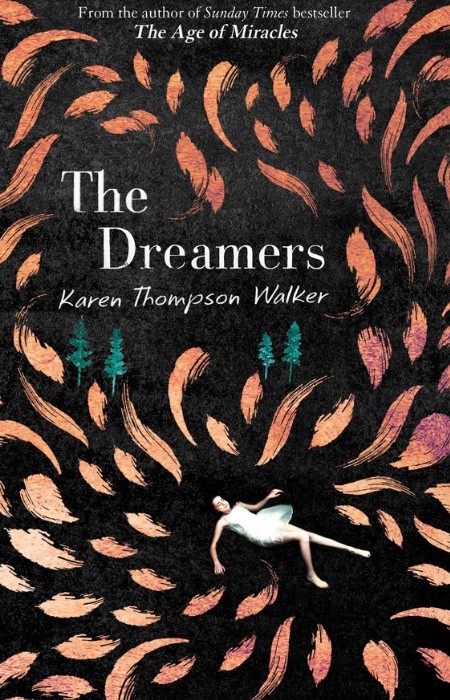
A strange affliction affects a few people in an isolated college town in California before cases begin to mount and what started as a small outbreak soon becomes a major contagion, a virulent wave of disease that sweeps through the town, and thanks to the efforts of a few willful dissenters, threatens to explode into the wider population.
In a bid to contain the nascent epidemic, officials seals the town off in what is called a “cordon sanitaire” and encourage people to stay in their homes, avoid contact with others, wear masks and practise social distancing if they have to venture out in public.
Sound familiar?
No, it’s not COVID-19 though many of the measures sound eerily familiar; this is an outbreak of a wholly other nature, a virulent disease that sends its sufferers into a dream-like state where they are, for all appearances, deep in a reposeful slumber.
What begins in Karen Thompson Walker’s The Dreamers with a few kids in a college dorm in the town of Santa Lora, California, soon becomes a full-blown health crisis, complete with hazmat suits, somewhat panicked officialdom and a mounting sense of doom and the world ending in a population that is convinced they will soon be next.
“But whoever shares her lipstick that day, whoever borrows her eyeliner, whoever kisses her cheek that night or dances too close or clinks her flute of champagne, whoever touches her hand to admire the ring, whoever catches the bouquet at the end of the night—all of them, every one, is exposed.
This is now sickness travels best: through all the same channels as do fondness and friendship and love.” (P. 137)
Much like the current pandemic which shows few signs in many countries of slowing down any time soon, a host of conspiracy theorists and armchair experts allege that the virus is a creation of government or the media, that the town isn’t real and all the people merely actors, and that no one is actually sick or dying.
But people are very much sick, and Walker paints an evocatively human timeline of what happens when disease begins to stalk people who out of nowhere drop off to sleep wherever they might be at the time, sometimes with instantly fatal consequences.
Bringing the overwhelmingly unknowable into sharply intimate relief, Walker introduces to the college students first, kids who are only six weeks into their tertiary studies and who, like most kids their age, think they are bullet-proof and life is a smorgasbord of nothing but positive possibilities.
One person who know that’s not quite true is Mei, a Chinese-American girl who is treated by her mostly white fellow students as some kind of oddity, an almost unwelcome diversion from the mainstream student archtype.
She isn’t, of course, but her experience, which Thompson Walker evokes with sometimes heartwrenching truthfulness, is part of The Dreamers’ exploration of what happens to society as a whole, friends and family when all the usual certainties of life are stripped away.

One couple who understands dislocation all too well even before the outbreak hits are Ben and Annie, new parents to a healthy daughter, who are, somewhat ironically, suffering from entrenched sleep deprivation when the first people begin to fall into their actively dreaming states. (Scans show people are using far more of their brain than normal and are anything but dormant, despite all appearances to the contrary.)
We also meet Libby and Sara, young daughters of a doomsday prepper whose basement is full of food and water and candles and a host of other supplies such as toilet paper, which has become emblematic in 2020 of what happens when people instinctively and irrationally panic, and who, when their dad falls asleep, are liberated from his paranoia and near-abusive behaviour, which likely stems from the death of his wife when his girls were just toddlers.
It is these intimate portrayals of people already under stress that add so much weight and emotional power to The Dreamers, which provides some answers but which is less concerned with laying out a scrupulously detailed timeline as it is with talking about how people, both afflicted and not, deal with the loss of life as they knew it.
Published in January 2019, The Dreamers is unnervingly prescient, delving with empathy and insight into the social effects of a gathering storm of disease and societal dislocation, quietly but sagely observing that the real threat often comes less from the disease itself than from the upheaval it engenders.
“‘Please,’ he says, his hands on her chest like he might still find some magic there. ‘Please wake up.’
There is a reasons that time seems to slow down in moments like these, a neurological process, discovered through experiment: in times of shock, the brain works faster—it takes more in. And so, some might say that this—the increased rate at which the neurons are firing—makes these first few seconds even more excruciating than they might otherwise be.
But forget all that. The only way to tell some stories is with the oldest, most familiar words: this here, this is the breaking of a heart.” (P. 223)
It might have been tempting to write some sort of sudsy, melodramatic tale of disease-afflicted doom-laden woe, but Walker, who demonstrated in The Age of Miracles that she is a deft hand at exploring apocalypses, both society-wide and deeply personal with affecting authenticity that do not need overblown narratives to have an impact, does not seen hyperbolic narratives to bring home the fact that the upturning of the established order can have quietly devastating effects on the people caught in its wake.
As Sara, one of the young girls who watches as the home she knows and the town she lives in change beyond recognition, observes at one point, the mounting march of the dreaming disease doesn’t come with loud bells and whistles and panicked cacophony but with silence and unnerving sense that all the usual markers of life have disappeared, seemingly instantly with no assurance they will ever come back.
Disasters often take place in the small inbetween moments of life, and while their effect might be wholly cataclysmic for all concerned, they don’t make the kind of noise or ruction that blockbusters would have us believe.
Thompson Walker stays true to this throughout The Dreamers which unfolds its ever more terrible though strangely dream-like toll – its victims, those that wake up eventually at least feel as if their memories are their future and vice versa, an upending of memory that leaves them feeling weirdly dislocated – with quietly affecting nuance and an emotional resonance that brings home the fact that while people falling sick and dying en masse sounds like it would bring on an apocalyptic cacophony (and truth be told, should given its catastrophic importance), the truth is the world ends very quietly and without much fanfare, leaving only those immune to its devastation to watch and observe and wonder how life will ever rise from the figurative ashes.
The Dreamers is prescient in ways that illuminate and explain how COCID-19 has affected and continues to affect the world in fatally terrible ways, helping us to understand that it is not only people who succumb to the effects of an epidemic or pandemic but societies as a whole, and even though the world will likely recover, as it does in this arrestingly immersive novel, the reality is that people and places affected will never be the same again.